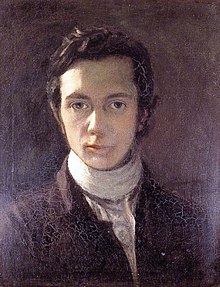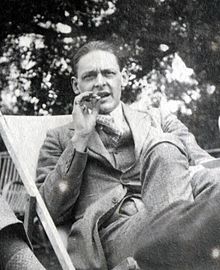Kubla Khan
The third and final stanza of the poem is the narrator's response to the power and effects of an Abyssinian maid's song, which enraptures him but leaves him unable to act on her inspiration unless he could hear her once again.
"[7] On 14 October 1797, Coleridge wrote a letter to John Thelwall which, although it does not directly mention "Kubla Khan", expresses many of the same feelings as in the poem,[note 1] suggesting that these themes were on his mind.
The manuscript states: "This fragment with a good deal more, not recoverable, composed, in a sort of Reverie brought on by two grains of Opium taken to check a dysentry, at a Farm House between Porlock & Linton, a quarter of a mile from Culbone Church."
The printed preface describes his location as "a lonely farm house between Porlock and Linton, on the Exmoor confines of Somerset and Devonshire," and embellishes the events into a narrative which has sometimes been seen as part of the poem itself.
"[13] The passage continues with a famous account of an interruption:[14] "At this moment he was unfortunately called out by a person on business from Porlock... and on his return to his room, found, to his no small surprise and mortification, that though he still retained some vague and dim recollection of the general purpose of the vision, yet, with the exception of some eight or ten scattered lines and images, all the rest had passed away.
[25] The Preface of "Kubla Khan" explained that it was printed "at the request of a poet of great and deserved celebrity, and as far as the author's own opinions are concerned, rather as a psychological curiosity, than on the ground of any supposed poetic merits.
Coleridge's preface says that he was reading the following sentence, or words of the same substance, in Purchas's Pilgrimage: Here the Khan Kubla commanded a palace to be built, and a stately garden thereunto.
Mount Amara is a real mountain, today called Amba Geshen, located in the Amhara Region of modern Ethiopia, formerly known as the Abyssinian Empire.
In fact the Blue Nile is very far from the other three rivers mentioned in Genesis 2:10–14, but this belief led to the connection in 18th and 19th century English literature between Mount Amara and Paradise.
[46] Charles Lamb provided Coleridge on 15 April 1797 with a copy of his "A Vision of Repentance", a poem that discussed a dream containing imagery similar to those in "Kubla Khan".
[47] There are additional strong literary connections to other works, including John Milton's Paradise Lost, Samuel Johnson's Rasselas, Chatterton's African Eclogues, William Bartram's Travels through North and South Carolina,[48][note 8] Thomas Burnet's Sacred Theory of the Earth, Mary Wollstonecraft's A Short Residence in Sweden, Plato's Phaedrus and Ion,[50] Maurice's The History of Hindostan, and Heliodorus's Aethiopian History.
In Xanadu did Kubla Khan A stately pleasure-dome decree: Where Alph, the sacred river, ran Through caverns measureless to man Down to a sunless sea.
So twice five miles of fertile ground With walls and towers were girdled round; And here were gardens bright with sinuous rills Where blossom'd many an incense-bearing tree; And here were forests ancient as the hills, Enfolding sunny spots of greenery.
[62] This is not to say they would be two different poems, since the technique of having separate parts that respond to another is used in the genre of the odal hymn, as in the poetry of other Romantic poets including John Keats or Percy Bysshe Shelley.
The poem expands on the gothic hints of the first stanza as the narrator explores the dark chasm in the midst of Xanadu's gardens, and describes the surrounding area as both "savage" and "holy".
Harold Bloom suggests that the power of the poetic imagination, stronger than nature or art, fills the narrator and grants him the ability to share this vision with others through his poetry.
[83] In the tradition from which Coleridge drew, the Tatars ruled by Kubla Khan were depicted as uncivilized worshippers of the sun, connected to either the Cain or Ham line of outcasts.
[84] The Tatars are connected to the Judaeo Christian ideas of Original Sin and Eden: Kubla Khan is of the line of Cain and fallen, but he wants to overcome that state and rediscover paradise by creating an enclosed garden.
[90] Later criticism continued to appreciate the poem, but no longer considered it as transcending concrete meaning, instead interpreting it as a complex statement on poetry itself and the nature of individual genius.
[93] The only positive quality which Hazlitt notes is a certain aesthetic appeal: he says "we could repeat these lines to ourselves not the less often for not knowing the meaning of them," revealing that "Mr Coleridge can write better nonsense verse than any man in English.
Even when we make all due allowance for the prejudices of critics whose only possible enthusiasm went out to 'the pointed and fine propriety of Poe,' we can hardly believe that the exquisite art which is among the most valued on our possessions could encounter so much garrulous abuse without the criminal intervention of personal malignancy.
"[106] In speaking of the three poems, he stated they "have besides that wealth of beauty in detail, of fine diction, of liquid melody, of sentiment, thought, and image, which belong only to poetry of the highest order, and which are too obvious to require any comment.
And over it is cast the glamour, enhanced beyond all reckoning in the dream, of the remote in time and space – that visionary presence of a vague and gorgeous and mysterious Past which brooded, as Coleridge read, above the inscrutable Nile, and domed pavilions in Cashmere, and the vanished stateliness of Xanadu.
But every crystal-clear picture there, is an integral part of a preconceived and consciously elaborated whole...In 'Kubla Khan' the linked and interweaving images irresponsibly and gloriously stream, like the pulsing, fluctuating banners of the North.
Moreover, the customary criticism of Coleridge as a cerebral poet would seem to be borne out by those poems such as This Lime-tree Bower my Prison or The Pains of Sleep, which tend more towards a direct statement than an imaginative presentation of personal dilemma.
More important is the musical effect in which a smooth, rather swift forward movement is emphasized by the relation of grammatical structure to line and rhyme, yet is impeded and thrown back upon itself even from the beginning".
For a century and a half its status has been unique, a masterpiece sui generis, embodying interpretive problems wholly its own...It would not be excessive to say that no small part of the extraordinary fame of 'Kubla Khan' inheres in its alleged marvellous conception.
"[135] In 1985, David Jasper praised the poem as "one of his greatest meditations on the nature of poetry and poetic creation" and argued "it is through irony, also, as it unsettles and undercuts, that the fragment becomes a Romantic literary form of such importance, nowhere more so than in 'Kubla Khan'.
"[18] Also in 1990, Thomas McFarland stated, "Judging by the number and variety of critical effort to interpret their meaning, there may be no more palpably symbolic poems in all of English literature than "Kubla Khan" and The Ancient Mariner.
[145] Harold Bloom, in 2010, argued that Coleridge wrote two kinds of poems and that "The daemonic group, necessarily more famous, is the triad of The Ancient Mariner, Christabel, and 'Kubla Khan.








